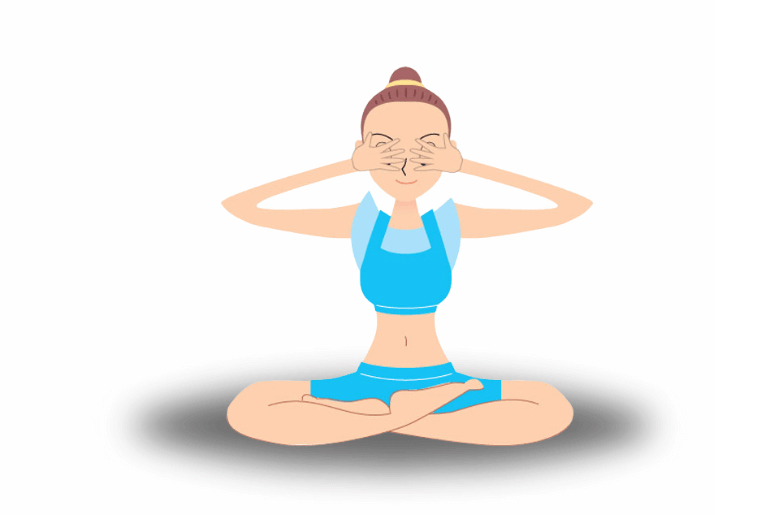Bhramari Pranayama, or Bee Breath, is a yoga breathing technique designed to promote calmness and reduce stress. It involves sitting comfortably, closing your eyes, and using your index fingers to gently press on the cartilage near your ears. After taking a deep breath in, you exhale while producing a steady, humming sound that resembles a bee. This practice not only helps to soothe the nervous system and alleviate anxiety but also improves concentration, promotes relaxation, and may aid in better sleep. The vibrations from the humming sound create a calming effect on the mind and body.
Benefits of Bhramari Pranayama:
- Reduces Stress and Anxiety
Bhramari Pranayama, or Bee Breath, is highly effective in alleviating stress and anxiety. The technique involves producing a soothing humming sound that calms the nervous system. This sound, combined with focused breathing, helps to relax the mind, reduce feelings of anxiety, and promote a sense of inner peace. By engaging in this practice regularly, you can manage daily stressors more effectively and create a more serene mental state.
- Promotes Relaxation
One of the primary benefits of Bhramari Pranayama or Bee Breath is its ability to induce relaxation. The gentle humming sound and deep breathing process stimulate the parasympathetic nervous system, which is responsible for the body’s rest-and-digest response. This results in a reduction in overall tension and a deep sense of calm, making it easier to unwind after a stressful day.
- Improves Concentration
By calming the mind and reducing mental chatter, Bhramari Pranayama or Bee Breath enhances focus and concentration. The practice creates a tranquil mental environment that facilitates better cognitive function and helps you stay present. This increased mental clarity can improve productivity and performance in various tasks and activities.
- Relieves Tension
The vibrations created during Bhramari Pranayama or Bee Breath help to release physical and emotional tension stored in the body. As the humming sound resonates through the head and chest, it alleviates tightness in the muscles and promotes a sense of overall relaxation. This can be particularly beneficial for those experiencing tension headaches or muscle tightness.
- Aids Sleep
Bhramari Pranayama can significantly improve sleep quality. By calming the mind and reducing anxiety, it helps to prepare the body for restful sleep. The relaxation induced by the practice can make it easier to fall asleep and stay asleep throughout the night, contributing to better overall sleep health.
- Regulates Blood Pressure
The relaxation benefits of Bhramari Pranayama or Bee Breath can also positively impact cardiovascular health. By reducing stress and promoting a calm state, the practice helps in lowering blood pressure. Regular engagement in this pranayama technique can support cardiovascular health and contribute to a more balanced blood pressure level.
- Enhances Respiratory Function
Engaging in Bhramari Pranayama supports better respiratory function by encouraging deep, controlled breathing. This practice strengthens the lungs and improves breath control, which can be beneficial for overall respiratory health. Enhanced lung function supports better oxygenation and overall vitality.
- Balances Emotions
Bhramari Pranayama helps in managing emotional disturbances by soothing the mind and reducing mental stress. The calming effect of the practice balances emotional responses and fosters emotional stability. Regular practice can contribute to a more balanced and resilient emotional state.
Disclaimer:
The information contained in this article is for educational and informational purposes only and is not intended as a health advice. We would ask you to consult a qualified professional or medical expert to gain additional knowledge before you choose to consume any product or perform any exercise.







